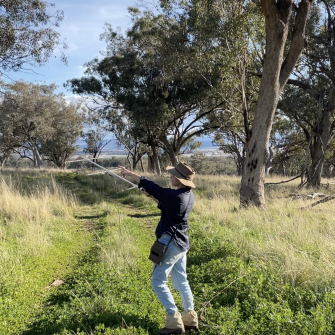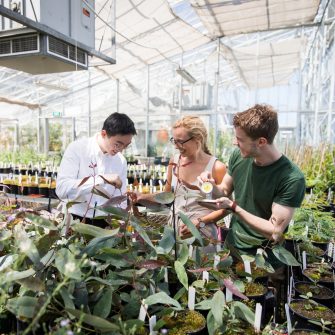Bachelor of Environmental Management / Arts
- Commencing Terms
- Term 1, 2 & 3
- Duration
- 4.7 Year(s)
- Delivery Mode
- Face-to-face (includes blended)
- Campus
-
Kensington
- Codes
- UAC code 429560
- Program code 3955
- CRICOS code 081121J
-
ATAR/2025 lowest selection rank
- 80.0 View all admission criteria
-
2026 Indicative first year full fee
- $10,000*
-
2026 Indicative full fee to complete degree
- $52,500*
-
2026 Indicative first year full fee
- $62,000*
-
2026 Indicative full fee to complete degree
- $300,000*

Application closures for 2026
International applications for all undergraduate programs, as well as postgraduate programs offered by the faculties of Arts, Design & Architecture, Engineering (excluding Master of Information Technology and associated programs) and Science are now closed to New Overseas Student Commencement (NOSC) for 2026 intakes.
Postgraduate programs offered by the Business School and the faculties of Law & Justice and Medicine & Health remain open. Master of Information Technology (and associated programs) also remain open.
- Overview
- Entry requirements
- What will I study?
- Future careers
- How to apply
- Fees & Scholarships
Overview
Establish the foundation of your future contribution to resolving the climate crisis. The Bachelor of Environmental Management / Bachelor of Arts will equip you to create positive change with a humane and sustainable impact. Prepare to apply new thinking to real-world problems.
You’ll explore how environmental science relates to the regulation, economic and social dimensions of environmental policy and management. The arts component of this double degree builds your industry-crossing skills in critical thinking, problem-solving, and effective communication.
Develop unique skills with a degree designed around your passions. Focus on ecology, biology, environmental chemistry, geography, earth science, or marine and coastal science. Pair your scientific knowledge with two arts subjects from a range of options in creative arts, humanities, social sciences, languages, and business.
Why study at UNSW?
Learn with the best
UNSW Science is home to globally recognised researchers and educators in the areas of climate change and sustainability. Our cross-disciplinary research influences important government and industry policies. Our world-class laboratories, clinics and simulators give you the tools to explore new frontiers and make meaningful scientific discoveries to benefit society.
- We’re ranked #38 globally for environmental science (QS World University Rankings by Subject, 2025).
- We’re ranked #2 in Australia for research output in Earth & Environmental Sciences (Nature Index Institution Outputs, 2024).
Leverage our industry connections
Reach your career goals with industry relevant skills and training. Tap into our network of 400+ industry and research partners to start building your own professional connections.
Learn from world-class educators
Study with passionate and pioneering educators, including quantum physicist and 2018 Australian of the Year Professor Michelle Simmons AO, Nobel Laureate Sir Fraser Stoddart, leading marine ecologist and ground-breaking recycling scientist Professor Veena Sahajwalla.
Want to see more from UNSW Science?
Entry requirements
-
- The 2025 Lowest Selection Rank (LSR) is the adjusted rank (ATAR plus adjustment factors) you would have needed to gain entry to this degree in 2025.
- The 2025 A levels score is based on four Advanced Level (A2) subjects. Entry scores are calculated from the best three or four A2 subjects (excluding repeated subjects) using the following values: A*=6, A=5, B=4, C=3, D=2, E=1. At most one Applied A Level subject may be included in the best four subjects used to calculate the aggregate.
- The 2025 IB Diploma is an indication of the IB you would have needed to gain entry to this degree in 2025. It is to be used as a guide only.
- The 2025 Lowest ATAR is the lowest ATAR (before adjustment factors were applied) to which an offer was made. Where <5 is listed, this indicates that less than 5 ATAR-based offers were made and so the score has not been published. N/A indicates no offers were made on the basis of ATAR.
*The Lowest ATAR to which an offer was made, for this program, is based on a UNSW Gateway Early Conditional Offer.
-
At UNSW, we are committed to ensuring prospective students have all the information they need in order to make informed decisions about their study options.
To assist you in gaining a better understanding of how Admissions works at UNSW, we have provided you with a summary of ATAR offers and the student profile.
We hope this information will help you identify the degree that is right for you.
Assumed knowledge
For Environmental Management: Mathematics Advanced plus one or more of Biology, Chemistry, Earth and Environmental Science, Physics. For Arts component: None
Adjustment Factors
We offer a range of adjustment factor schemes that reward students for academic performance and extra-curricular achievements. These schemes also take into account a range of personal and educational disadvantages that may have affected your studies.
HSC Plus
This scheme rewards students who perform well in Year 12 subjects that are relevant to their preferred UNSW degree. You may be awarded up to five points.
Elite Athletes, Performers and Leaders (EAPL)
This program recognises achievements in the areas of sport, academia, leadership and music at an elite level. You may be eligible for up to five points.
Educational Access Scheme (EAS)
Factors such as illness, financial hardship, language difficulties or attending a particular school can mean you don't always get the best possible marks in Years 11 and 12. If one of these situations applies to you, submit an application for the Educational Access Scheme (EAS) via UAC. Eligible students can receive between 1 and 10 points towards their chosen UNSW degree.
Admission pathways
Your ATAR is not the only measure of your potential to succeed, which is why we offer a range of pathways into university. Explore your options below and get in touch with our Future Student Advisers to discuss your path to UNSW.
Gateway Admission Pathway
This scheme is open to students who attend Gateway schools, live in a low-socioeconomic area based on IRSAD and IEO indexes of SEIFA criteria, or are an Aboriginal and Torres Strait Islander person. It adjusts the ATAR requirements for your preferred UNSW degree and provides early offers and early conditional offers to UNSW.
Entry programs for Australian Aboriginal and Torres Strait Islander people
We offer entry programs for Indigenous Australians, including the Indigenous Preparatory Programs and the Indigenous Admission Scheme (IAS). The entry pathway program you apply for will depend on the degree you want to study.
English language requirements
You may be asked to provide evidence of your English proficiency to study at UNSW depending on your educational background and citizenship. English language skills are vitally important for coping with lectures, tutorials, assignments and examinations - this is why UNSW requires a minimum English language competency for enrolment.
If you’re completing an Australian Year 12 qualification (e.g. NSW HSC or equivalent), you do not need to provide anything extra to prove your proficiency. Your qualification will be used as evidence of your English proficiency.
If you do need to provide evidence of your English proficiency, this will be indicated in your application. You can prove this by providing evidence that you meet one or more of the following criteria:
- English language tests and university English courses
- Prior study in the medium of English
- Other qualifications
If you need to improve your English skills before you start your degree, UNSW College’s Academic English Programs are for you. The programs are suitable for various English levels and help you prepare for university studies and life in Australia.
For more details, visit the English Language Requirements page.
International direct entry
Information for applicants with CBSE, HKDSE or Singapore A Levels Qualification
Calculating your CBSE Score:
Awarded by CBSE, average percentage marks across English or Hindi, and your best four remaining subjects. Where marks are given as a range, the mid-point for that range is used e.g. 75 to 80 = 77.5.
Calculating your HKDSE Score:
Entry requirements are based on the aggregate of the best 5 achieved category A subjects (category B and C subjects are not considered).
For subjects other than Citizenship and Social Development: level 5**=7 points, level 5*=6 points, level 5=5 points, level 4=4 points, level 3=3 points, level 2=2 points, level 1=1 point, Level U=0 point.
For subject Citizenship and Social Development: Attained=2 points, Unattained=0 point. Citizenship and Social Development will only be counted towards the aggregate if the 2 points awarded for Attained ranks among the student’s best five scoring subjects.
If Mathematics Compulsory Part and Extended Part (Module 1 or 2) are both presented, both scores can be counted.
Calculating your Singapore A Levels:
Due to significant changes to the GCE A-Level Curriculum and University Admissions Score (UAS) calculation effective 2026, UNSW assessment is currently under review.
Note: Entry requirements published on this page are correct as of the day of publication and may change without notice.
We do not accept secondary qualifications from this country. We may accept tertiary study results, please contact us for more information.
Please contact us for direct entry requirements.
Admission pathways
If you do not meet the requirements for direct entry into your chosen degree, you may be eligible for a pathway program with UNSW College. UNSW College provides alternative entry options using university-approved content so that you can start your UNSW journey with confidence.
English language requirements
You may be asked to provide evidence of your English proficiency to study at UNSW depending on whether you are from an English-speaking background or non-English speaking background. English language skills are vitally important for coping with lectures, tutorials, assignments and examinations - this is why UNSW requires a minimum English language competency for enrolment.
If English is not your first language, you’ll need to provide proof of your English proficiency before you can be given an offer to study at UNSW. You can do this by providing evidence that you meet one or more of the following criteria:
- English language tests and university English courses
- Prior study in the medium of English
- Other qualifications
If you need to improve your English skills before you start your degree, UNSW College’s Academic English Programs are for you. The programs are suitable for various English levels and help you prepare for university studies and life in Australia.
For more details, visit the English Language Requirements page.
Check the specific English language requirements for this program
What will I study?
UNSW is introducing a new academic calendar from 2028.
We are moving to a new flex-semester calendar. What does this mean for your studies?
This double degree consists of a Bachelor of Environmental Management and a Bachelor of Arts.
As part of the Bachelor of Arts, you'll study:
- A major specialisation of your choice
- A minor specialisation of your choice
- Prescribed electives
OR
- A major specialisation of your choice
- A second major specialisation of your choice
In the Bachelor of Environmental Management you'll study:
- An approved major
- Compulsory courses
- Prescribed electives
The Bachelor of Environmental Management degree includes compulsory courses, a choice of disciplinary majors and choices from a group of directed electives. Majors include Biology, Earth Science, Ecology, Environmental Chemistry, Geography and Marine and Coastal Science.
Bachelor of Environmental Management prescribed electives include:
- Environment and society
- Environment, Sustainability, and Development
- Environmental Justice
- Managing People
- Environmental Advocacy and Activism
- The Animal: Worker, Wild, Extinct?
- Environmental History
- Business Ethics and Sustainability
The Bachelor of Arts develops your skills in critical thinking, communication, and research. You'll explore foundational questions of human existence and the complexities of societies, cultures, and histories. You'll have choices from a wide range of elective courses and exciting opportunities for industry engagement.
Bachelor of Arts prescribed electives include:
- Academic Writing for the Humanities
- Research Integrated Learning
- Presentation and Communication Skills
- ADA Professional Placement
- Personalised English Language Enhancement
- Presentation and Communication Skills
- Taste of Research Project: Arts and Social Science
- Arts & Social Sciences Global Internship
Study areas
-
-
-
You can complete a minor in the study areas listed above, as well as:
-
For detailed information on the full program structure, please visit the handbook.
Future careers
Environmental careers are often multidisciplinary and can integrate many fields such as physical, biological and information sciences. Professionals not only study the environment and human impact - they also explore solutions like renewable energy, natural resource management and sustainable development. Environmental careers span across many different industries including mining, civil engineering, natural resource management, government, geology, research and teaching.
Environmental science analyses and provides solutions to current environmental challenges including waste management, climate change and pollution. To protect the planet, environmental scientists study, develop and advise on future policies. These policies can be embedded within government legislation to ensure the survival of flora, fauna and other natural resources.
Potential careers
- Science communicator/educator
- Policy specialist
- Environmental researcher
- Environmental consultant
- Environmental manager
- Environmental advocate
How to apply
Applications for undergraduate study from domestic students (Australian citizens, Australian permanent residents, Australian permanent humanitarian visa holders and New Zealand citizens) are processed by the Universities Admissions Centre (UAC).
Visit the Apply section of the UAC website and you can nominate up to five degrees in order of preference, with the first being your most desired degree and university.
On-time applications for admission usually close at the end of September each year for Term 1 admission. Late applications can be submitted, but a late fee will apply. For study starting in Term 1, the majority of offers are made in December and January. Visit the UAC website for key dates for admission outside of Term 1.
Ready to start your application?
For most international students, applications are submitted via our Apply Online service. We encourage you to submit your completed application as early as possible to ensure it will be processed in time for your preferred term.
Some high-demand programs with limited places, may have an earlier application deadline or may have an earlier commencement date. For details, visit the international admissions information page.
*If you are an international student studying an Australian qualification, go to the Universities Admission Centre (UAC) for application and UAC key dates. Note: If you are under 18 years of age, you need to make special arrangements. For details, visit the under 18 international students page.
Ready to start your application?
Fees & Scholarships
Commonwealth Supported Place multiple Student Contribution Bands may apply for this double degree. See single degrees for the applicable fee bands.* The student contribution for a Commonwealth Supported Place is an indication only of the amount payable in Year 1 based on a standard full-time load of 48 credit points (1.0 EFTSL). The actual student contribution you will be liable for depends on your individual program of study and the calendar year in which you enrol. Actual fees are calculated upon enrolment. Student contribution amounts are subject to annual review by the University and may increase each year during your studies (subject to caps determined by the Australian Government), effective at the start of each calendar year. The indicative fees listed here are based on an estimated average and are for tuition only other fees and charges are not included.
*Fees are subject to annual review by the University and may increase annually, with the new fees effective from the start of each calendar year. The indicative fees listed here are based on an estimated average and are for tuition only, other fees and charges are not included. The amount you pay will vary depending on the calendar year to enrol, the courses you select and whether your study load is more or less than 1 Equivalent Full Time Student Load (8 courses per year).
Indicative fees are a guide for comparison only based on current conditions and available data. You should not rely on indicative fees. More information on fees can be found at the UNSW fees website.
Indicative fees to complete the program have been calculated based on a percentage increase for every year of the program. Fee increases are assessed annually and may exceed the indicative figures listed here.
Indicative fees to complete the program include tuition plus an estimate of study-related costs of approximately $1,000 per year. To find out more about other costs, visit UNSW International.
Scholarships
At UNSW, we award over $83 million in scholarships each year. We pride ourselves on rewarding excellence and making university accessible to students from all walks of life. Whether you’re a domestic or international student, our range of scholarships, prizes and awards can support your journey.
Progress starts here – at a world-leading university

Top 20 Worldwide
UNSW is ranked #20 university in the world
QS World University Rankings, 2024–2026

Most Employable Graduates
Winner of the AFR Most Employable University Award six years in a row
AFR Top100 Future Leaders Awards, 2020–2025

Australia's #1 for Innovation
Highest number of startups and spinouts from university-developed tech
SCOPR report, 2024






